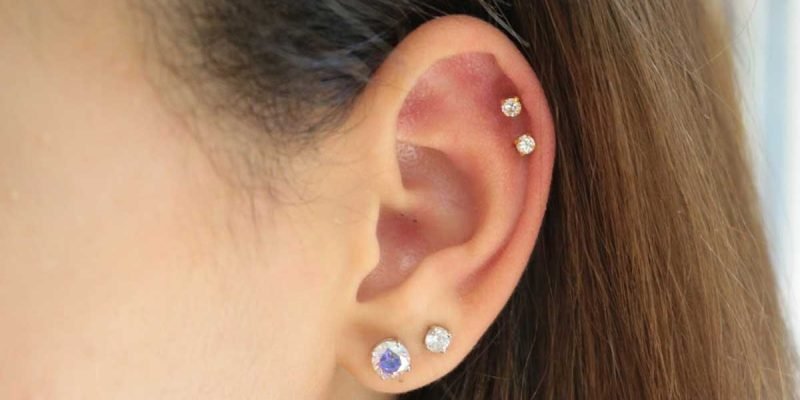Helix Piercings have been trendy among many young people. It shows your taste of fashion and willingness to match your ear to your outfit. Besides that, it looks pretty rad too.
Many celebrities, e.g. Cardi B and Danielle Bregoli have been rocking the helix piercing. It Is also a versatile piece of jewellery that can be matched with the rest of your earrings.
What are helix piercings?
Helix piercings are a cartilage piercing, which means they get pierced through the harder, flexible part of your ear. There are different types for example a low, high or even double helix piercing.
There is also a possibility to connect two helix piercings to each other by a chain. If you wanted them connected by a barbell, it will be called an industrial piercing, which also goes through the upper ear and the cartilage.
How to take care of a helix piercing?
Since many people love to start decorating their ear with a helix piercing means there has been many questions around how to take care of one.
The risk of people getting an infection is either due misinformation, carelessness or hygiene from the piercer him/herself. In both cases it is crucial to seek advice from a licenser professional either in a piercing studio or online. Here are some examples of what (not) to do:
Do not touch your piercing with bare hands
It is recommended to not touch your piercing since it is practically a wound that has been made by a fine needle. Touching the freshly placed piercing with your bare hands will introduce germs into the piercing and the risk of getting an infection surges.
If you do decide to touch your piercing, make sure your hands are clean and washed. Throughout the day there are many things you touch without realizing it. These things, for example a computer mouse, have collected many germs from different days or even people.
Avoid pressure
Putting pressure on your piercing might cause the piercing to become crooked. Pressure can be caused by sleeping on the side of your freshly placed piercing, putting your hand on your ear or headphones that are resting on the piercing itself. Avoid pressure at all costs for at least 2 to 3 weeks.
Do not clean with alcohol
Cleaning with alcohol is a big no. Alcohol will cause the piercing wound to see it as a foreign substance and eventually the body will want to reject the piercing.
It has been said around the internet a lot but we do not recommend using any type of oil either. Oil will also cause more damage. Even tea tree oil is not good for your piercing.
Use a sterile saline solution
Licensed piercers will often recommend a sterile saline solution, which is salt based and used to clean your piercing at least twice a day.
If you do not have a sterile saline solution, we recommend just using running water to clean your piercing or saltwater. Do not use water from a public swimming pool nor swim in it. Try to avoid swimming in a public pool for at least 2 to 3 weeks. Chlorine might disrupt the healing process.
Go for a downsize
After getting pierced, the are might get swollen and red. To take this into account, piercer often use a longer piercing to go with the swelling. If they don’t, the chance of it getting swallowed into the skin surges.
After 3 weeks you can go back to the piercer and get a downsize, a smaller piercing. Do not try to do this yourself, as your piercing has just healed and you might open the wound again or the piercing hole closes and you have to get it pierced again, after healing the open wound.
Do not take out your piercing jewel if you think you have an infection
When your ear is getting swollen and infected, do not take out your piercing unless a professional or a doctor says so. If you take out your piercing, you might trap the infection under the skin which becomes difficult to manage, and to say the least: very painful.
If you think you have caught an infection, it is recommended to go to a licenser piercer and they will guide you to a doctor. A piercer does not always know how to handle a infection but they should know how to prevent one. Aftercare also plays a big part in preventing an infection, which means it is also your responsibility.














Comments